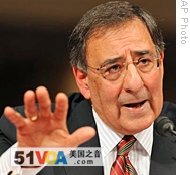06 February 2009
 |
| Leon Panetta testifying before the Senate Intelligence Committee, 05 Feb 2009 |
Leon Panetta says the United States may continue sending detainees to other countries for interrogation and imprisonment, but only on condition that they are treated humanely.
On the second day of confirmation hearings, former White House chief of staff Leon Panetta took back comments he made Thursday relating to Bush administration policies on detainee renditions.
"That particular quote, that people were transferred for purposes of torture, that was not the policy of the United States," he said. "It was clearly to transfer people for purposes of questioning and receiving assurances that that would not take place. So to that extent, yes, I would retract it."
Panetta said the United States could continue to send detainees to other countries for legal action, but only under strict conditions.
"Using renditions, we may very well direct individuals to third countries. I will seek assurances that they will be not treated inhumanely," Panetta said.
The top Republican on the committee, Senator Christopher Bond of Missouri, took Panetta to task for suggesting the Bush administration knowingly sent detainees to other countries to be tortured.
"A nominee for this very important position cannot be making statements or making judgments based on rumors or news stories," said Bond.
Some detainees who were sent by the Bush administration to countries in the Middle East and Eastern Europe for interrogation and imprisonment say they were tortured.
Panetta said he believes Bush administration made its decisions on renditions thinking they would protect the security of the United States. But he said he believes mistakes were made.
"The approaches that were taken, decisions that were made, as to how we treat individuals, has a serious downside in terms of causing damage to the moral authority of this country around the world," he said. "Our greatest weapon is our moral authority and stature and view that we always abide by the Constitution. I think that the sense that we were willing to set that aside I think did damage our security."
Panetta also pledged, if confirmed, to curtail the CIA's use of outside contractors, but didn't rule out using them for certain, unspecified circumstances.
Senator Dianne Feinstein, a California Democrat and chairwoman of the committee, called on the agency to severe ties with private contractors.
Former CIA Director Michael Hayden had acknowledged that the CIA used such contractors for conducting harsh interrogations at the secret prisons used by the agency. Many lawmakers are concerned that private contractors may not be held accountable for their actions.
The Senate Intelligence Committee could vote on Panetta's nomination as early as next week, with the full Senate expected to confirm him soon after the committee acts.